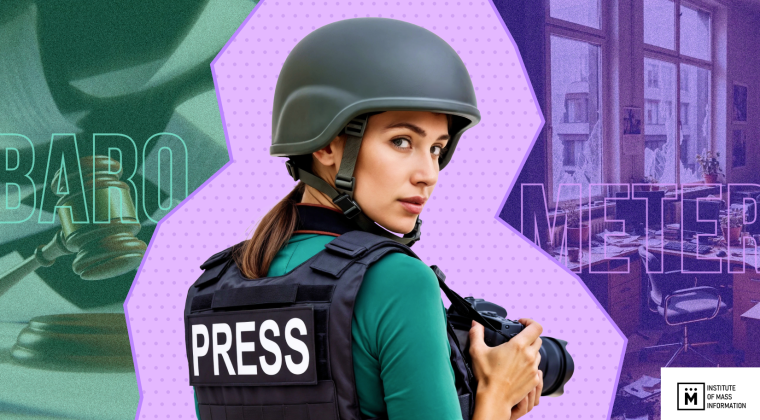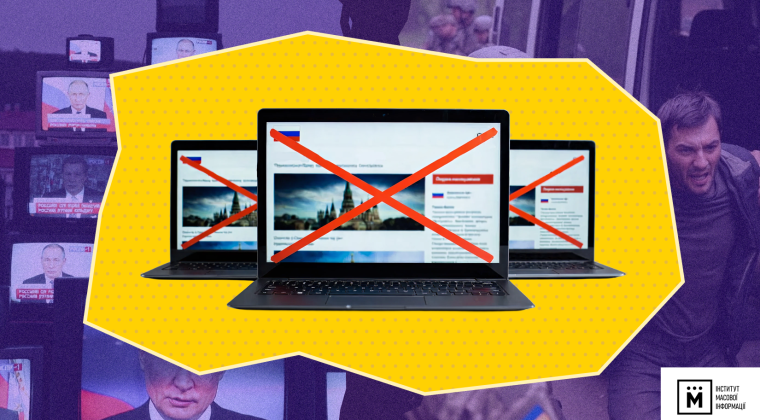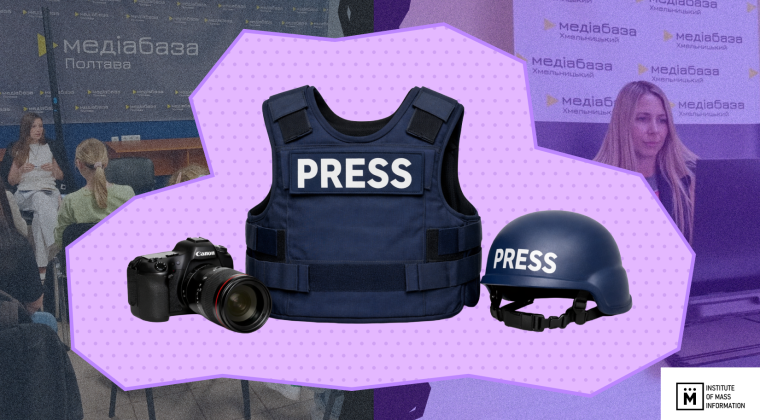By tradition, on the brink of the Autumn, the Institute of Mass Information publishes the results of its research on the transparency in online editions. We publish here the first part of the study of media transparency, which concerns three basic parameters – availability of contact details of the edition, information of the person responsible for the content (manager / editor-in-chief), and about the media owner.
According to the results of the annual IMI survey, in 2021, 50% of Ukrainian media were found out to be mostly transparent. This is 10% more than in 2020 and 20% more than in 2019.
Based on IMI monitoring and Similar Web data, we have selected and scrutinized 50 online media. Popular websites were not included in the study if they were aggregators with no one’s own news, or foreign media, or the edition that the access to which was blocked by sanctions imposed by the presidential decree. If the site belonged to another type of media (newspaper, TV channel), then this was the website that we studied, no content in other sources was not taken into account (except for redirection from the site to another related to it) *.
In total, six main parameters were studied, namely whether the following data were made public or not:
1) contacts, names;
2) editor-in-chief / manager;
3) the owner;
4) published editorial policy;
5) financial transparency;
6) details of sources for photos placed in the materials.
That is, each media could get a total score of 0 to 6 points. The average overall transparency score in 2019 was 1.78, in 2020 was about 2.5, and this year it was 2.95. As we can see, the overall transparency of online media is mounting. Although the overall average score is still less than half of the possible maximum, totaling less than 3 out of 6 possible, it is still largely due to such complex transparency parameters as public policy, financial transparency and compliance with copyright of photos. No quality of content, in particular compliance with professional standards of journalism, was covered by this study (IMI has separate studies on this topic).
Compared to last year, the following online media have improved their performance: Ukrainian BBC Service, Ekonomicheskie Novosti, Bagnet, ICTV, Kommentari, Interfax, Golos-ua, Vesti, Segodnya, Vgolos. UNIAN, channel 24, Ogladach, Suspilne, Dzerkalo Tyzhdnya, Hromadske.TV”, Slovo I Dilo, Ukrinform, Espresso, Radio Liberty, Liga, NV, Censor.NET, RBC, Korrespondent and Ukrainska Pravda. Particular progress has been made on Suspilne’s website, which has been significantly updated over the past year, as well as on the Obozrevatel and Channel 24, which published its editorial policies.
According to the study, 48% of the media were mostly transparent (scored 2.5 or 3 for a maximum of 3), 38% – with an average level of transparency (1.5-2 points), 12% – mostly opaque (0.5-1 points) ) and completely opaque – 2% (0 points).
Mostly transparent were: Economicheskie Novosti, Depo.ua, ICTV, Focus, Fakty, Glavred , Apostroph, Golos.UA, Ukrainski Novyny, Segodnya, UNIAN, Channel 24, Ogladach, TSN, Suspilne, Dzerkalo Tyzhdnya, Hromadske, Slovo I Dilo, Ukrinform, Espresso , Liga.net, NV, RBC, Bukvy.
Partially transparent: ” Rakurs, BBC (Ukrainian service), Bagnet, Podrobnosti, Anticor”, Interfax, Pryamy, Khvylya, KP.yua, Vesti, Glavkom, Vgolos , Politeka, Babel, UNN, Zakhid.NET, Gordon.UA, Censor.NET and Ukrainska Pravda.
The following online media turned out to be mostly opaque: Korrespondent, Radio Svoboda, Znay.UA, Gazeta.UA, Telegraph and Kommentari.
The online media From-UA, which does not publish any initial data about its editorial office or owner, turned out to be completely opaque once more.
CONTACTS
The published contact details allow to contact the media in case of need to correct or supplement the information they made public. In addition, it is an element of the image, because the complete absence of such data may be one of the signs evidencing this is a drain tank, the “editors” of which naturally do not want to be exposed and prosecuted for the information disseminated.
Given the available resources, our study did not include a test of how effectively the contact information provided on the site allowed to contact the editorial office (in addition, the ability to contact may vary depending on the time of day, day of the week and even season). The experts looked for of a postal address, e-mail address and telephone number. In this year’s study, given the popularity of social networks, instead of publishing the phone number we admitted the address of the page on the social network.
The full contact details on the site were published by the following media: RBC, NV, Liga, Zakhid.NET, UNN, Radio Svoboda, Espresso, Ukrinform, Slovo i Dilo, Hromadske, Dzerkalo Tyzhdnya, Suspilne, Babel, TSN, Ogladach, Channel 24, Politeka, Znay, UNIAN, Vgolos, Segodnya, Gazeta.UA, Glavkom, Vesti, Ukrainski Novyny, Telegraph, Holos.UA, Apostrophe, Pryamy, Interfax, Glavred, Fakty, Focus, Anticor, ICTV, Economicheskie Novosti, Podrobnosti and Depo.UA (76% of respondents).
Instead, no contacts were made public by From-UA and Korrespondent. But in some media it is really hard task to find contacts, for example on the site “Voice.UA” they become visible only if you click on the “Christmas tree” at the bottom of the site page (a separate section “Contacts” on the main page is not displayed, like other source data). Although in itself such a sign can be perceived as a redirection to the top of the page, this option occurs on websites quite often. In some media, at least some contacts can be found only in the “Advertising on the site”. Such a well-known resource as the Ukrainian service of BBC doesn’t mention any of its contact in Ukraine, only information about the main office.
INFORMATION ABOUT THE EDITOR-IN-CHIEF OR ANOTHER EDITOR-IN-CHIEF
The reputation of the entire publication also indirectly depends on the reputation and actions of the head. The study took into account the fact that the name of the head was published on the website with an indication of his status (it is clear that the relevant position was not always called “editor in chief”).
The following media turned out to be transparent under this aspect: Depo.UA, Rakurs, Ekonomicheskie Novosti, Bagnet, Focus, Fakty, Glavred, Interfax, Khvylia, Apostrophe, KP.ua , Golos.UA, Ukrayinski Novyny, Vesti, Segodnya, UNIAN, site of Channel 24, Ogladach, TSN, Babel, Suspilne, Dzerkalo tyzhdnya, Slovo I Dilo, UNN, Liga, Gordon.UA, NV, Censor.NET, RBC, Korrespondent and Ukrainska Pravda, Bukvy (64% in total).
There is no information about one’s executives: Zakhid.NET, Ukrainian service of Radio Svoboda, Politeka, Znay.UA, Vgolos, Gazeta.UA, Glavkom, Telegraph, From-UA, Kommentari and even websites well-known TV channels or TV programs, a number of which don’t have any data about the head in general or about the editor-in-chief of the site: Pryamyy and Podrobnosti.
The Ukrainian BBC service has only a redirection to the main English-language site, but the head of the Kyiv office is still not mentioned, only the managers of the BBC in Britain. The original were Bahnet and Economicheskie Novosti, which indicated two editors-in-chief each. The data on the Segodnya website look a bit confusing, where job titles are listed, in particular, as “Product-leader”, “Product lead”.
MEDIA OWNERS (FINAL BENEFICIARIES)
Too many media outlets are under influence of its owners who control the editorial policy and, consequently, the content. Owners often have some political preferences, so they can promote their own or friendly political forces and discredit their enemies. Ukrainian legislation does not explicitly prohibit online media from having political preferences, as we simply do not have separate legislation to regulate them. But the indication of the ultimate beneficiary in the initial media data gives his audience some understanding of the degree of independence of online media.
Not all of the studied media more or less directly mentioned those who owned them, but those who made such an indication received 1 point, which meant full transparency in this aspect.
Precise individuals – beneficiaries (or the state, the government) have been indicated on its websites by the following media: ICTV, Pryamy, Ukrainski Novyny, Vgolos, Channel 24, Ogladach, SUspilne, Hromadske.TV, Bukvy, Ukrinform, Espresso (a total of 22% of respondents, although last year there were 24%). The sites of TV channels in this part have their own specificities, as they are obliged to display transparency of the ownership by the law on television and radio broadcasting. However, such data should be updated once a year: on Pryamyy (as well as on other sites of TV channels) the data for the last year mentioned Mr. Makeyenko, but formally the requirements of the profile law on a site of the TV channel are fulfilled (an updated information on Petro Poroshenko should appear in six months).
A more common option for transparency in this aspect, although not as complete, is to indicate a legal entity that owns the site in some way, perhaps even informally. Then, according to the State Register of Legal Entities, Individual Entrepreneurs and NGOs, it is possible to find its final beneficiary, founders, according to the respective legal entity. Although not every legal entity has a beneficiary listed in the State Register, and the founders may no longer be related to it, according to the IMI methodology, the indication of at least a legal entity gave online media 0.5 points. After all, the indication of a legal entity related to online media gives at least some idea of its history, location, and the failure to indicate its ultimate beneficiary in the register often, though not always, indicates the dispersion of corporate rights among many owners. It was necessary to indicate the full name of the legal entity,including organizational and legal form.
The following media indicated the legal entity on their website: Depo.UA, BBC (on the page of the main office in English),Economicheskie Novosti, Podrobnosti, Focus, Facty, Glavred, Apostoroph”, KP.ua, Golos.UA, Glavkom, Segodnya, UNIAN, Politeka, TSN, Dzerklalo Tyzhdnya, Slovo I Dilo, Zakhid.NET, Liga, NV and RBC (42% of researched). At the same time, last year they were 10% more numerous.
The study revealed many fun facts. For example, from previous years we know about the page on the UNN website, which mentioned the founder of this news agency, but how to get to it through the main page of the site now, this is unknown, so the relevant information is not available to the readers. Some media (TSN, UNIAN), probably controlled by Mr. Kolomoisky, mentioned legal entities, but they are not listed in the state register of final beneficiaries, as their ownership structures lead to Cyprus. A similar situation on the Glavred website.
Website of Segodnya mentioned even on two different entities – LLC “Segodnya Multimedia” and JSC “Segodnya Multimedia” . According to the state register, the PJSC has already been terminated, there is only a limited liability company, but outdated information on the site creates confusion for readers.
As for the legal entity behind KP.ua, the beneficiary is a certain Bradley Matthew Adrian (Belize) in the state register, which raises some doubts about the realism of the data, given the identity of one of the previous owners. The Apostrophe media site contains the ownership structure of Apostrophe TV LLC, but the initial data of the site indicate that it belongs to another structure: “Implemented with the participation and using the resources of the International Center for Policy Studies.” There is a link to the ICPS website , but it does not indicate its legal form, although there is a detailed description of the activities.
The methodology did not provide for verification of the authenticity of the media owners declared on the websites or in the state register, as it would require a separate investigation for each media outlet.
18 media outlets (36%) did not even hint who owned them, despite the fact that 24% of last year’s survey had anonymous media to such an extent. In other words, the level of transparency in the ownership of leading online media has decreased, but partly due to the removal of several media outlets (in particular, due to the sanctions) and the popularity of new sites, which are not always transparent.
In the following publication, we will discuss other aspects of our study of online media transparency: disclosure of editorial policies, financial transparency, and indication of photo sources (copyright compliance).
* The day this research was published, the owners of the Bukvy edition contacted IMI, who promptly added information about the acting editor-in-chief to the website. In this regard, the study data was updated. IMI is urging other media to improve their transparency.
** The study included the following online publications: Pravda.com.ua, Korrespondent.net, Rbc.ua, Censor.net.ua, Nv.ua, Gordonua.com, Liga.net, Zaxid.net, Unn.com.ua, Radiosvoboda.org, Espreso.TV, Ukrinform.ua, Bykvu.com, Slovoidilo.ua, Hromadske.ua, Zn.ua, suspilne.media, Babel.ua, Tsn.ua, Obozrevatel.com, 24tv.ua, Politeka.net, Znaj.ua, Unian.net, vgolos.com.ua, Segodnya.ua, Gazeta.ua, Glavcom.ua, vesti.ua, Ukranews.com, telegraf.com.ua, golos.ua, Kp.ua, Apostrophe.ua, Hvylya.net, From-ua.com, prm.ua, Interfax.com.ua, glavred.info, Fakty.ua (сайт газети), Comments.ua, Focus.ua, antikor.com.ua, Ictv.ua, Podrobnosti.ua, Bagnet.org, enovosty.com, www.bbc.com/ukrainian, racurs.ua, depo.ua.
This study was made possible by the support of the American people through the USAID Media Program in Ukraine, implemented by the international organization Internews Network. The content is under the sole responsibility of the Institute for Mass Information and does not necessarily reflect the views of USAID, the US Government or the Internews Network.



